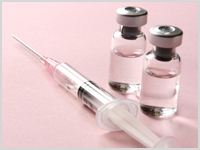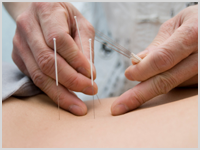
SOLUTIONS
HOW TO TREAT MENOPAUSE
Here we will cover the various forms of treatment currently offered for menopause relief. As for which is best, that can be disputed. We are not here to make any such claims. Our goal is to simply share our knowledge and help you make the right decision for your specific situation.

HORMONE REPLACEMENT
THERAPY (HRT)
HRT is possibly the most popular – and effective – treatment for menopausal symptoms. HRT refers to the injection of processed hormones into a woman’s body via pill, patch, gel, cream, skin spray, subcutaneous implants, etc.
HRTs are renowned for their ability to relieve most symptoms of menopause and help fight osteoporosis. However, recent studies show that while they’re highly beneficial for fighting symptoms of menopause, long-term use of HRTs is associated with adverse side effects such as increased chances of breast cancer, cardiovascular disease and blood clots.
Recent developments have shown light on a new, healthier form of HRT, known as bio-identicals, or BHRT. The difference between a BHRT and a standard HRT is that the bio-identical hormones are molecularly structured in a way that your body absorbs and reacts to them more easily. BHRT can take many forms, with compounded and over the counter bioidentical progesterone creams being a very popular choice. As always, consult your doctor before starting any new treatment or supplement.

PRESCRIPTIONS
Aside from HRTs, there are a handful of other prescriptions that can offer relief from symptoms of menopause. Once again, HRTs are the most popular because they offer the most complete relief from hot flashes – the most widely dreaded symptom of all. However, here are some other prescription drugs known to help alleviate symptoms of menopause:
- Antidepressants – Aside from obviously helping to relieve depression (yet another symptom of menopause), antidepressants have been said to help treat hot flashes, too.
- Gabapentin – Sold primarily as a drug for treating seizures, it’s also known to help with hot flashes.
- Clonidine – Another drug said to be good at treating hot flashes. Originally formulated to fight high blood pressure. Note: negative side effects are common.
- Bisphosphonates – A popular non-hormonal way to treat bone density loss and osteoporosis.
- SERMs (Selective Estrogen Receptor Modulators) – SERMs mimic the effects of estrogen to help prevent breast cancer and osteoporosis, but can come with dangerous side effects such as blood clots, stroke or endometrial cancer.
- Vaginal Estrogen – Treats dryness, discomfort and urinary symptoms by applying a small amount of estrogen directly to the vagina via a tablet, ring or cream.
While prescriptions are all individually effective, mixing pills to fight various symptoms can be counter-productive or even dangerous and addictive. Not to mention perpetually expensive. If you can afford it, and they work in your case, then more power to you. If you can’t afford it, or you’re just not a fan of popping pills, then perhaps alternative medicine is the way to go.

ALTERNATIVE MEDICINE
The term “alternative medicine” covers a broad range of menopausal treatments. This could be anything from an herbal remedy to acupuncture.
One common form of alternative medicine is phytoestrogens – a botanical source that mimics the effects of human steroidal estrogen. However, while safer than their counterpart SERMs, some studies question the validity of phytoestrogens in combating osteoporosis and other symptoms of menopause.
Acupuncture has been highly regarded as being able to subdue hot flashes, but is also questioned in its validity to treat other symptoms of menopause. Meditation and yoga are also known to help.

SUPPLEMENTS
Supplements are considered a form of alternative medicine, but for the sake of clarity, we will create a separate category for them here. Below is a list of supplements commonly consumed to fight symptoms of menopause.
- Black Cohosh – The top selling menopause supplement in the U.S., this root is apparently great at fighting hot flashes, although recent studies dispute its efficacy. Beware though; it can also be toxic for your liver.
- Flaxseed – Known for alleviating mild cases of hot flashes and night sweats.
- Calcium – while it doesn’t help relieve those pesky hot flashes, calcium is crucial in preventing bone loss and osteoporosis.
- Red Clover – the natural estrogen in this plant is thought to help alleviate symptoms of menopause, but it is currently unproven. Red Clovers are also considered to increase risk of estrogen-positive cancers.
- Vitamin D – like calcium, its primary function is maintaining bone density.
- Wild Yams – They have natural compounds resembling estrogen and progesterone. But so far, clinical studies have not found that they ease menopausal symptoms.
- Ginseng – Popular for improving mood and sleep, but no signs of alleviating hot flashes.
- St. John’s Wort – A well-known remedy for depression, but once again, no help for the other symptoms of menopause.
- Sage – Once thought to offer immortality, sage does have estrogen-like qualities. Preliminary studies are promising, but nothing conclusive can be determined yet.
- Dong Quai – This root has been a popular ingredient in Chinese medicine for thousands of years. However, recent clinical studies show no benefits. And possible side effects.
- Soy – Apparently great at reducing hot flashes, but unbalanced estrogen levels can cause side effects as well.
As always, consult your doctor before taking any medication for your menopause symptoms. Or any medication at all, for that matter. Hopefully this outline of possible menopausal solutions has helped you understand the benefits and risks of what’s out there...
And whatever solution you and your doctor agree upon, always practice healthy living in conjunction with the choices you make:

EXERCISE
Regular exercise—at least 30 minutes a day, 3 times a week—can significantly reduce symptoms of menopause, especially combating weight gain and bone density loss. Furthermore, not exercising can increase symptomatic stress, so the benefits of working out are compounded.
Help us help the world. Millions of women out there are suffering from menopause, and so are their families. The more information we share, the more we can help one another.


- Envisioning ‘cool’ scenarios during hypnotherapy helps women cope with hot flashes
- Progesterone for hot flush and night sweat treatment
- Progesterone for Symptomatic Perimenopause Treatment
- Clarifying the correlation between HRTs and breast cancer
- Losing weight may help relieve hot flashes in obese women
- Progesterone Cream for Vasomotor Symptoms of Menopause





